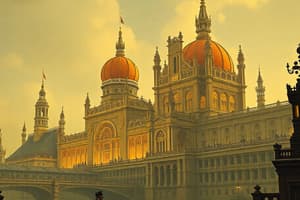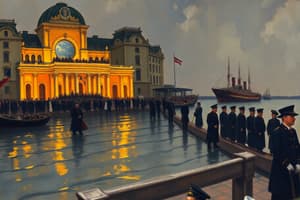Podcast
Questions and Answers
Which factor most directly contributed to the tense atmosphere among European nations before World War I?
Which factor most directly contributed to the tense atmosphere among European nations before World War I?
- Unified political agendas and alliances.
- Widespread economic cooperation and trade.
- Shared cultural values and beliefs.
- Intense nationalistic rivalry and economic competition. (correct)
What role did the Balkans region play in the lead-up to World War I?
What role did the Balkans region play in the lead-up to World War I?
- The region's instability due to competing nationalistic aspirations fuelled the conflict. (correct)
- It was a region where ethnic groups had no interest in independence.
- It served as a model of peaceful coexistence and harmony.
- It was a neutral and uninvolved region with no affect on the conflict.
How did the competition for markets impact the relationship between European powers?
How did the competition for markets impact the relationship between European powers?
- It created a shared understanding of trading practices.
- It generated an environment of mistrust and rivalry. (correct)
- It led to peaceful agreements between the powers.
- It fostered a sense of mutual benefit and cooperation.
While the assassination of Archduke Franz Ferdinand is considered the spark, what was its relationship to the larger causes of World War I?
While the assassination of Archduke Franz Ferdinand is considered the spark, what was its relationship to the larger causes of World War I?
What primarily motivated various imperial pursuits by European powers in the pre-World War I era?
What primarily motivated various imperial pursuits by European powers in the pre-World War I era?
How did imperialism contribute to the start of World War I?
How did imperialism contribute to the start of World War I?
Which of the following was a key aspect of national prestige and power during the age of imperialism?
Which of the following was a key aspect of national prestige and power during the age of imperialism?
How did the 'scramble for Africa' contribute to the tensions leading to World War I?
How did the 'scramble for Africa' contribute to the tensions leading to World War I?
What role did economic interests play in the imperialism of the pre-World War I era?
What role did economic interests play in the imperialism of the pre-World War I era?
Why did the arms race contribute to the outbreak of World War 1?
Why did the arms race contribute to the outbreak of World War 1?
How did the system of alliances contribute to the expansion of World War I?
How did the system of alliances contribute to the expansion of World War I?
What does the 'culture of militarism' refer to in the context of pre-World War 1 Europe?
What does the 'culture of militarism' refer to in the context of pre-World War 1 Europe?
Which event directly resulted in the declaration of war and the beginning of World War I?
Which event directly resulted in the declaration of war and the beginning of World War I?
Flashcards
Nationalism in World War I
Nationalism in World War I
Strong national pride and a belief in the superiority of one's nation, often leading to resentment and conflict with other nations.
Economic Competition in World War I
Economic Competition in World War I
The competition for economic dominance and control over markets and resources created tensions and mistrust between European nations.
Assassination of Archduke Franz Ferdinand
Assassination of Archduke Franz Ferdinand
The assassination of Archduke Franz Ferdinand in Sarajevo triggered a chain of events that led to World War I.
Imperialism's Role in World War I
Imperialism's Role in World War I
Signup and view all the flashcards
Militarism in World War I
Militarism in World War I
Signup and view all the flashcards
Imperialism
Imperialism
Signup and view all the flashcards
Imperialist Rivalry
Imperialist Rivalry
Signup and view all the flashcards
Resource and Territory Disputes
Resource and Territory Disputes
Signup and view all the flashcards
Militarism
Militarism
Signup and view all the flashcards
Arms Race
Arms Race
Signup and view all the flashcards
Entangling Alliances
Entangling Alliances
Signup and view all the flashcards
Moroccan Crises
Moroccan Crises
Signup and view all the flashcards
Study Notes
Imperialism's Role in World War 1
- Imperialism, the policy of extending a country's power and influence through diplomacy or military force, significantly contributed to the outbreak of World War I.
- European powers aggressively competed for colonies and resources in Africa, Asia, and the Pacific.
- This competition fostered intense rivalries and mistrust among nations, especially among the Great Powers (Germany, Austria-Hungary, France, Great Britain, and Russia).
- Acquiring and controlling colonies was essential for national prestige and power.
Causes of Conflict related to Imperialism
- Direct competition for resources and territories created a tense international atmosphere.
- Rivalry over colonies led to political tensions and mistrust.
- Economic considerations were vital in the pursuit of colonies.
- Colonial populations resisted European powers, often resulting in conflict.
Examples of Imperialist Tensions Leading to War
- The scramble for Africa saw European powers divide the continent, disregarding ethnic and tribal boundaries.
- Conflicts over spheres of influence in China and the Middle East increased international instability.
- Competition for raw materials and markets intensified tensions, creating a climate for conflict.
- The Moroccan Crises, a series of diplomatic confrontations involving Germany and French ambitions in Morocco, highlighted escalating tensions.
The Arms Race and Militarism
- The competitive atmosphere fuelled an arms race, boosting military spending and developing new weaponry.
- This increased fear and encouraged aggressive stances, worsening animosity.
- Militarism promoted the use of force to resolve disputes.
- The belief in military conflict as inevitable or desirable influenced leaders' decisions.
Alliances and Entangling Commitments
- European powers formed complex military alliances.
- These alliances obligated nations to defend each other, drawing in previously uninvolved countries.
- The assassination of Archduke Franz Ferdinand triggered a cascade of war declarations, largely due to these entangled alliances.
Nationalism and its Part in World War 1
- Strong nationalistic feelings existed throughout many European populations.
- Nationalism fueled resentment and antagonism toward other nations.
- Nationalist aspirations for independence and self-determination amongst Balkan ethnic groups played a role in regional conflicts.
Economic Competition
- Competition for economic power created mistrust between nations.
- Competition for markets was a key aspect of European rivalry.
- Controlling trade routes and markets was a key motivator for imperial pursuits.
How the Immediate Trigger (Assassination) was Connected to the Larger Picture
- Though the assassination of Archduke Franz Ferdinand initiated the war, it stemmed from years of escalating conflicts and tensions.
- The larger context of imperialism, militarism, and nationalism provided the background for the assassination to escalate into a global war.
- The assassination was the final point of friction in a strained environment, triggering a series of events leading to World War I.
Studying That Suits You
Use AI to generate personalized quizzes and flashcards to suit your learning preferences.




